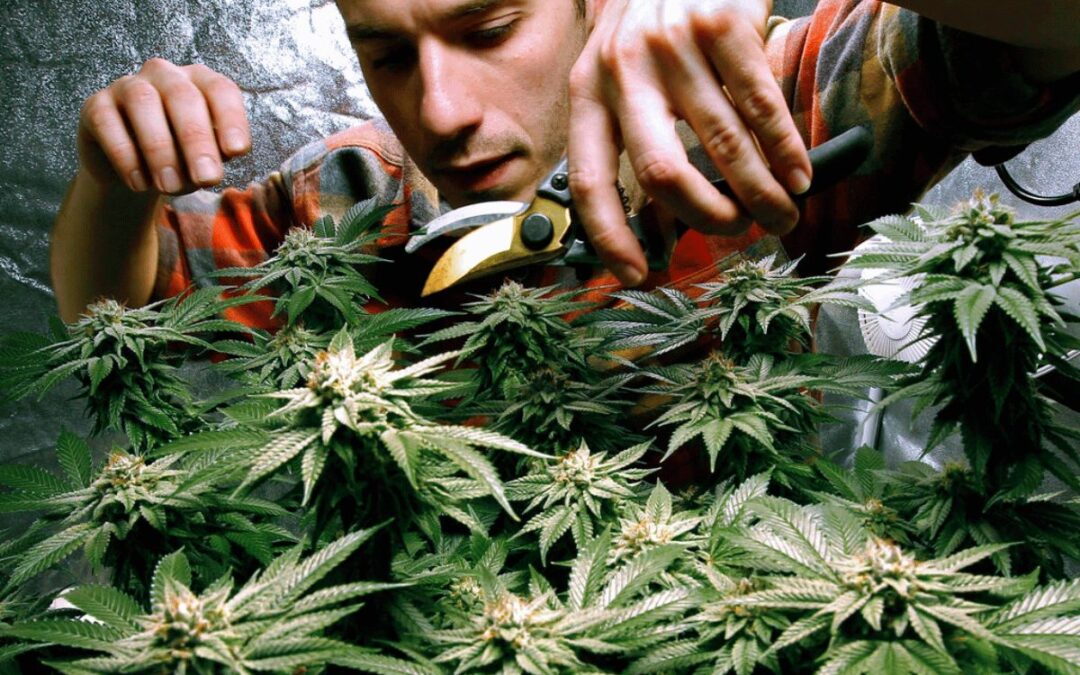
(AP Photo/Richard Vogel, File)
As a Democratic candidate for governor of New Hampshire, some of my primary goals include legalizing cannabis and creating more affordable housing. Legalization is not an entirely partisan issue, and in fact, our House of Representatives was the very first legislative body in the country to pass legalization (the State Senate has always been the spoiler).
Today—after four terms in office—Governor Chris Sununu has successfully maneuvered through an entire political career without passing legalization. All the while, NH consumer dollars are pouring into neighboring state budgets.
Various proposals have been shot down over the years, ranging from a laissez faire flat repeal of all state cannabis laws, to limited private franchises, to tasking the NH Liquor Commission with distribution. Governor Sununu explicitly favors the franchise model, which is ironically the least federally acceptable tactic. A franchise model is a poison pill that will only result in litigation and challenges from the federal government—yet another way for Sununu to have his cake and eat it too.
Hybrid Cannabis Model
So we’re left with revisiting the liquor commission model. I’m a restaurant owner, so I’m unfortunately deeply familiar with the cumbersome bureaucracy of the NH Liquor Commission. When I was exploring a run, I had briefly considered proposing changes to the way our liquor commission operates.
However, in reviewing the state budget, it’s clear that the liquor commission brings in millions of dollars every year. Without the liquor commission’s stranglehold on the sale of alcohol in our state, NH would need a new, substantial tax—such as an income tax or broad sales tax—to be able to make ends meet.
This is because the design of the state liquor commission is a very pure form of socialism: government-owned monopoly of a product. The liquor commission was created in 1933, in response to the repeal of federal prohibition, at a time when there were no private liquor stores to object to this proposal, and no private businesses to compete. Nearly a century later, we’re still benefiting from that socialist policy choice.
In reflecting on 91 years of the pros and cons of our state-run liquor model, I’m proposing a hybrid state-run/farmers market cannabis model that invests all profits into expanding the supply of affordable housing in our state, without excluding local businesses from participating in this economic boon.
Weed for Housing
After some research into the impact of legal cannabis on neighboring states, it seems likely that NH could net $100-200 million through a state-run cannabis model. If these funds are transferred exclusively to the NH Housing Authority, it would multiply their state-funded budget by a magnitude of 10-20 times.
The NH Housing Authority is a laudable program. They help finance low-income housing; they educate first-time homebuyers and assist them with down-payment; they also manage some of the housing voucher programs. But for these services, NH only contributes about $10 million from the state’s Real Estate Transfer Tax. The NHHA relies largely on federal funding, leaving NH residents at the mercy of gargantuan federal programming unadjusted for local variables.
It is imperative that the state of New Hampshire—the Live Free or Die state—develop an alternative funding source to address our housing crisis that is independent of the federal government. Unless residents prefer an income tax or broad sales tax, state-run cannabis is our best option.
Getting into the Weeds
Instead of tasking the existing liquor commission with managing the distribution of cannabis, I am proposing the creation of an entirely separate legal entity which merely mirrors the operation of the liquor commission.
In addition to state-run cannabis dispensaries, I propose a “farmers market” license allowing NH residents to grow in smaller quantities for small-volume retail sale. Whenever NH decides to legalize, we will be the last state in New England. Large cannabis companies have had substantial time to build up capital in bordering states, so they’ll have a leg up if we allow them to operate in NH. It’s important that our local economy is given a fair shot at engaging in this market.
We’ve benefited greatly from the 1933 policy decision to socialize the sale of liquor in our state. Cannabis is now moving into its own post-prohibition era, but NH is last to the table. As a result, our legalization model must creatively maximize tax revenues without excluding local entrepreneurs, and without simply opening the market to established out-of-state companies.
With the strong majority of Granite Staters supporting legalization, we’re long past the point of arguing whether cannabis should be legal. Instead we must determine how. As governor, I will pass legislation that legalizes cannabis in a hybrid state-run/farmers market model. I will legalize homegrow and extend medical cannabis cards for any provider-approved medical need. A hybrid model represents the best of the 1933 liquor commision model with none of the failures.

NH marijuana legalization clears Senate with future still uncertain
In a marathon 11 hour session Thursday, the New Hampshire State Senate on Thursday passed HB 1633, a bill legalizing recreational use marijuana in...

Weed legalization in New Hampshire hits another snag
Hope for getting recreational weed in New Hampshire legalized any time soon has once again gone up in smoke. On Monday, the commission tasked with...

Recreational weed isn’t legal in New Hampshire – yet.
In New Hampshire, you can only buy alcohol from tax-free, state-run liquor stores. In a few weeks, a special commission is supposed to release a...
No Results Found
The page you requested could not be found. Try refining your search, or use the navigation above to locate the post.


